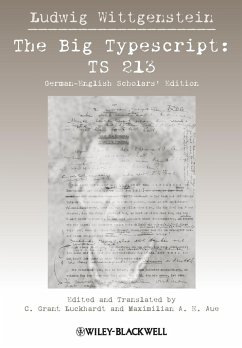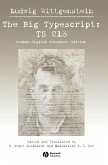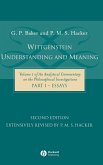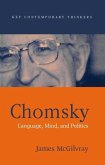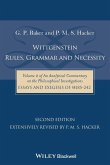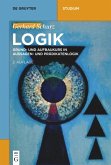Long awaited by the scholarly community, Wittgenstein's so-called Big Typescript (von Wright Catalog No.TS 213) is presented here in an en face English-German scholar's edition.
Presents scholar's edition of important material from 1933, Wittgenstein's first efforts to set out his new thoughts after the publication of the Tractatus Logico Philosophicus
Includes indications to help the reader identify Wittgenstein's numerous corrections, additions, deletions, alternative words and phrasings, suggestions for moves within the text, and marginal comments In 1933, Wittgenstein set out to dictate a collection of his recent writings to a typist in the form of a book. Even as he was dictating he began revising the text extensively, so that the surviving typewritten manuscript contains numerous corrections, additions, deletions, alternative words and phrasings, suggestions for moves within the text, and marginal comments in both handwritten and typed form.
Long awaited by the scholarly community, Wittgenstein's so-called Big Typescript (von Wright Catalog no. TS 213) is presented here for the first time in an en-face German-English scholars' edition, complete with clear indications to help the reader identify the various levels of Wittgenstein's editing.
This text provided a rich source of material for Wittgenstein's subsequent writings, and therefore serves as a key to understanding much of his later philosophy.
In 1933, Wittgenstein set out to dictate a collection of his recent writings to a typist in the form of a book. Even as he was dictating he began revising the text extensively, so that the surviving typewritten manuscript contains numerous corrections, additions, deletions, alternative words and phrasings, suggestions for moves within the text, and marginal comments in both handwritten and typed form.
Long awaited by the scholarly community, Wittgenstein's so-called Big Typescript (von Wright Catalog no. TS 213) is presented here for the first time in an en-face German-English scholars' edition, complete with clear indications to help the reader identify the various levels of Wittgenstein's editing.
This text provided a rich source of material for Wittgenstein's subsequent writings, and therefore serves as a key to understanding much of his later philosophy.
In 1933, Wittgenstein set out to dictate a collection of his recent writings to a typist in the form of a book. Even as he was dictating he began revising the text extensively, so that the surviving typewritten manuscript contains numerous corrections, additions, deletions, alternative words and phrasings, suggestions for moves within the text, and marginal comments in both handwritten and typed form.
Long awaited by the scholarly community, Wittgenstein's so-called Big Typescript (von Wright Catalog no. TS 213) is presented here for the first time in an en-face German-English scholars' edition, complete with clear indications to help the reader identify the various levels of Wittgenstein's editing.
This text provided a rich source of material for Wittgenstein's subsequent writings, and therefore serves as a key to understanding much of his later philosophy.
Presents scholar's edition of important material from 1933, Wittgenstein's first efforts to set out his new thoughts after the publication of the Tractatus Logico Philosophicus
Includes indications to help the reader identify Wittgenstein's numerous corrections, additions, deletions, alternative words and phrasings, suggestions for moves within the text, and marginal comments In 1933, Wittgenstein set out to dictate a collection of his recent writings to a typist in the form of a book. Even as he was dictating he began revising the text extensively, so that the surviving typewritten manuscript contains numerous corrections, additions, deletions, alternative words and phrasings, suggestions for moves within the text, and marginal comments in both handwritten and typed form.
Long awaited by the scholarly community, Wittgenstein's so-called Big Typescript (von Wright Catalog no. TS 213) is presented here for the first time in an en-face German-English scholars' edition, complete with clear indications to help the reader identify the various levels of Wittgenstein's editing.
This text provided a rich source of material for Wittgenstein's subsequent writings, and therefore serves as a key to understanding much of his later philosophy.
In 1933, Wittgenstein set out to dictate a collection of his recent writings to a typist in the form of a book. Even as he was dictating he began revising the text extensively, so that the surviving typewritten manuscript contains numerous corrections, additions, deletions, alternative words and phrasings, suggestions for moves within the text, and marginal comments in both handwritten and typed form.
Long awaited by the scholarly community, Wittgenstein's so-called Big Typescript (von Wright Catalog no. TS 213) is presented here for the first time in an en-face German-English scholars' edition, complete with clear indications to help the reader identify the various levels of Wittgenstein's editing.
This text provided a rich source of material for Wittgenstein's subsequent writings, and therefore serves as a key to understanding much of his later philosophy.
In 1933, Wittgenstein set out to dictate a collection of his recent writings to a typist in the form of a book. Even as he was dictating he began revising the text extensively, so that the surviving typewritten manuscript contains numerous corrections, additions, deletions, alternative words and phrasings, suggestions for moves within the text, and marginal comments in both handwritten and typed form.
Long awaited by the scholarly community, Wittgenstein's so-called Big Typescript (von Wright Catalog no. TS 213) is presented here for the first time in an en-face German-English scholars' edition, complete with clear indications to help the reader identify the various levels of Wittgenstein's editing.
This text provided a rich source of material for Wittgenstein's subsequent writings, and therefore serves as a key to understanding much of his later philosophy.
"Experts used to regard an edition of this much revised typescript as well-nigh impossible. Now they have been proved wrong: Aue and Luckhardt have miraculously succeeded in producing a scrupulously accurate and at the same time highly readable edition and translation of this previously missing link between Wittgenstein's Tractatus and his later writings." -- Joachim Schulte, Universität Bielefeld
"Here is Wittgenstein's most important unpublished typescript, expertly edited and superbly translated. Required reading for anyone interested in what Wittgenstein wrote after the Tractatus and before the Philosophical Investigations." -- David Stern, University of Iowa
"Here is Wittgenstein's most important unpublished typescript, expertly edited and superbly translated. Required reading for anyone interested in what Wittgenstein wrote after the Tractatus and before the Philosophical Investigations." -- David Stern, University of Iowa
Experts used to regard an edition of this much revised typescript as well-nigh impossible. Now they have been proved wrong: Aue and Luckhardt have miraculously succeeded in producing a scrupulously accurate and at the same time highly readable edition and translation of this previously missing link between Wittgenstein's Tractatus and his later writings.
Joachim Schulte, Universität Bielefeld
Here is Wittgenstein's most important unpublished typescript, expertly edited and superbly translated. Required reading for anyone interested in what Wittgenstein wrote after the Tractatus and before the Philosophical Investigations.
David Stern, University of Iowa
Joachim Schulte, Universität Bielefeld
Here is Wittgenstein's most important unpublished typescript, expertly edited and superbly translated. Required reading for anyone interested in what Wittgenstein wrote after the Tractatus and before the Philosophical Investigations.
David Stern, University of Iowa

